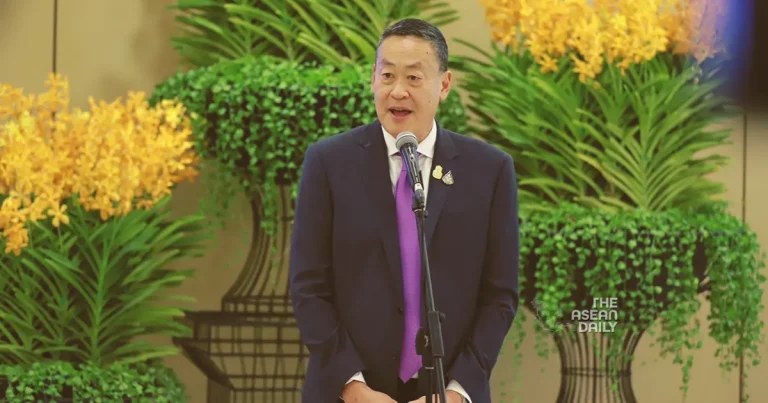15-6-2024 (BANGKOK) Prime Minister Srettha Thavisin has resolutely dismissed rumours of his impending resignation or the dissolution of the House of Representatives. This firm stance comes as the nation holds its collective breath, awaiting a pivotal ruling from the Constitutional Court that could potentially unseat the premier from his position of power.
The case in question, initiated by a group of 40 senators in May, alleges that Srettha’s appointment of the controversial politician Pichit Chuenban as a minister in the Prime Minister’s Office violated ethical norms enshrined in Sections 170 (4) and (5) of the Thai Constitution. These provisions govern the conduct and integrity expected of cabinet ministers.
Amidst the swirling speculations, Srettha delivered an unwavering statement on Friday, asserting, “I never think about [resignation or a House dissolution]. Let the legal procedure take its course. I never think of running away.” His resolute words echoed through the political corridors, underscoring his determination to face the legal challenges head-on.
The prime minister further acknowledged the court’s authority, stating, “When the judges have questions, I have the duty to explain and respect their decision.” In a strategic move, Srettha’s legal team has submitted a list of additional witnesses to bolster their defence before the esteemed judicial body.
While Pichit Chuenban resigned from his ministerial post prior to the court’s acceptance of the petition – a move widely interpreted as an attempt to shield Srettha from legal entanglement – the prime minister’s fortunes remain inextricably tied to the court’s impending ruling.
The Constitutional Court, cognizant of the gravity of the situation, has instructed all parties involved to submit their lists of witnesses and evidence by the forthcoming Monday. The pivotal hearing is scheduled for the following day, with the nation’s political fate hanging in the balance.
Should the court rule against Srettha, his tenure as prime minister could come to an abrupt end. However, his prospects of prevailing in this high-stakes legal battle are believed to have been bolstered by the appointment of the esteemed legal specialist, Wissanu Krea-ngam, as an adviser.
Wissanu, whose first task was to meticulously examine the intricacies of the prime minister’s defence, has publicly stated that his role involved reviewing both factual and legal aspects of the case, drawing upon documents prepared by the prime minister’s secretariat and the Council of State. Notably, Wissanu clarified that while he did not draft the defence himself, he played a crucial role in scrutinizing the documents before their submission to the court on June 7.
The crux of the controversy lies in the appointment of Pichit Chuenban, a polarising figure who once served as the legal counsel for former Prime Minister Thaksin Shinawatra and, more recently, as an adviser to the incumbent Srettha Thavisin. Pichit’s chequered past, which includes a six-month jail sentence in 2008 for attempting to bribe court officials during a high-profile land deal case involving Thaksin, has raised questions about his eligibility to serve in the cabinet.
As the nation grapples with the implications of this constitutional conundrum, political analysts and observers have weighed in on the potential ramifications. Yuttaporn Issarachai, a respected political science lecturer at Sukhothai Thammathirat Open University, underscored the profound impact the court’s decisions could have on Thailand’s political landscape.
“The outcome of the court cases could change the political landscape,” Yuttaporn cautioned, highlighting the far-reaching consequences that extend beyond the prime minister’s fate.
Should Srettha be removed from office, Yuttaporn envisions a seismic shift in the nation’s political terrain, with a new prime minister elected by parliament and the potential formation of a fresh coalition government driven by realigned alliances.
Adding to the complexity of the situation, the Constitutional Court is also set to hear a case on Tuesday that could potentially lead to the dissolution of the main opposition Move Forward Party (MFP). Yuttaporn speculated that if the MFP is disbanded, some of its members might migrate to other parties, further reshaping the fragile coalition dynamics.




